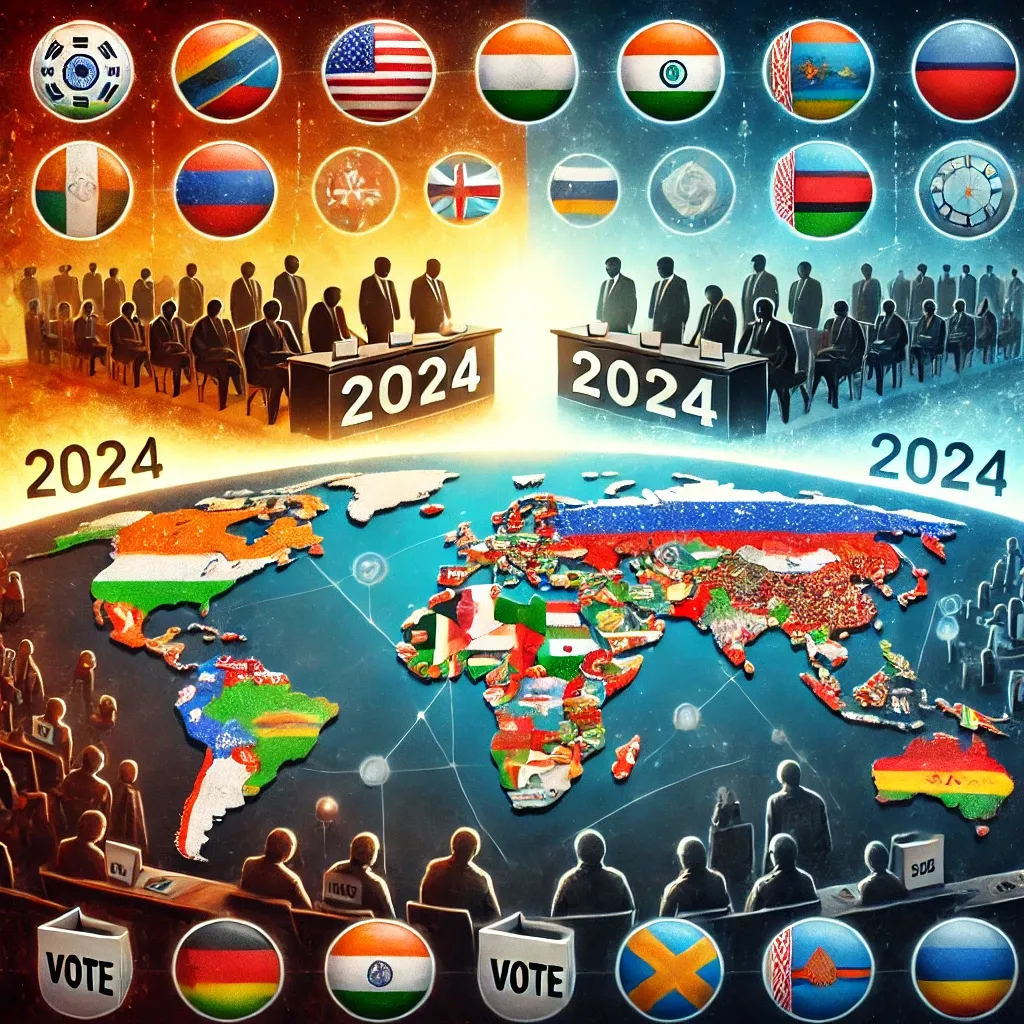The 2024 Elections: Global Democracy at a Crossroads – A Look at What’s Ahead and What’s Already Unfolded

Introduction: A Defining Year for Global Democracy
As of November 3, 2024, the world is well into a pivotal election year, with nearly 80 countries—representing nearly half of the world’s population—holding elections. With some elections already completed and others still pending, the outcomes continue to redefine democratic values. In a year marked by rising populism, authoritarianism, and digital manipulation, the 2024 elections reveal both the challenges and resilience of democracy worldwide.
Elections That Have Taken Place
Mexico - an Historic Election for Gender Equality – June 2, 2024
In early June, Mexico held its presidential election, where Claudia Sheinbaum won the race. Upon winning, she became Mexico’s first female president, a symbolic victory for gender equality. However, the country faces urgent issues, including rampant violence from drug cartels and strained economic relations with the United States. The election, with its historic implications, is shaping Mexico’s domestic policies and its approach to immigration, trade, and cooperation with the U.S..
European Union Parliamentary Elections: June 6-9, 2024
The European Union held its parliamentary elections in early June, revealing a significant surge in support for populist and right-wing parties. These elections challenged the EU's liberal framework, with new members of parliament representing stronger anti-immigration stances and Euroscepticism. With member states like France, Italy, and Hungary leaning further right, the European Parliament’s influence on migration policy and relations with Russia has become increasingly complex. European Commission President Ursula von der Leyen, a strong advocate for Ukraine, now faces increased opposition from parliament members who favor cautious engagement with Russia and a potential pivot toward protectionist policies.
Indonesia: A New Direction in Southeast Asia – February 14, 2024
Indonesia’s presidential election on February 14, 2024, saw a close race between contenders Prabowo Subianto and Ganjar Pranowo, with Prabowo emerging victorious. His background as a former military general raised concerns internationally, as his previous human rights record has cast a shadow over Indonesia’s democratic aspirations. Prabowo’s leadership marks a shift in Indonesia's political landscape, with increased focus on security and a potentially harder stance on domestic opposition—a move that has sparked debate about the future of democracy in Southeast Asia.
India: Modi’s Third Term Confirmed – April-May 2024
India held its parliamentary elections from April 10 to May 12, 2024, with Prime Minister Narendra Modi securing a third term through his Bharatiya Janata Party (BJP). Modi’s nationalist approach, emphasizing Hindu identity, won him considerable domestic support but also increased concerns about religious tensions and centralization of power. Critics argue that the BJP's victory may solidify a trend toward authoritarianism within India, as opposition parties struggle to maintain influence against a highly centralized government. India’s evolving role as a counterweight to China remains vital, but its democratic values face greater scrutiny both domestically and internationally .
Key Votes to Watch in the Final Months of 2024
United States: A Nation on the Brink – November 5, 2024
Just two days from now, the United States will hold one of its most divisive elections in recent history. With Vice-President Kamala Harris facing former President Donald Trump, the choice reflects deep-seated ideological divisions. Harris represents continuity with a multilateral foreign policy approach, while Trump’s nationalist platform calls for an “America First” agenda, including skepticism toward NATO and foreign alliances. The outcome could drastically influence the nation’s stance on climate policy, support for Ukraine, and relations with global powers like China.
Observers note that Trump’s return could benefit Russia, particularly in the ongoing Ukraine conflict, while a Harris re-election would likely reinforce NATO’s support of Ukraine. The election’s implications extend beyond U.S. borders, potentially reshaping alliances and trade policies around the world
Pakistan: Inflation and Conflict – Expected in February 2024
Though initially planned for early 2024, Pakistan’s election remains under intense scrutiny. Former Prime Minister Imran Khan has exerted influence despite his removal, and the military’s role in shaping political outcomes has grown prominent. Pakistan faces severe economic hardship, a weak currency, and terrorism concerns, particularly along the Afghan border. With the army’s sway over electoral matters, the legitimacy of Pakistan’s democracy remains in question, and the results may have significant implications for regional stability.
Corrupt Elections: Reinforcing Power in Belarus and Rwanda
Belarus: Lukashenko’s Iron Grip on Power
In Belarus, President Alexander Lukashenko faces little to no opposition as he continues to enforce authoritarian control. This election has become a formality, reinforcing Lukashenko’s alignment with Russia and continued repression of political dissent. Belarus's support of Russia in the Ukraine conflict has resulted in Western sanctions, leaving the nation more isolated from Europe. The lack of democratic freedom is expected to persist, with Lukashenko prioritizing stability over political reform.
Rwanda: Kagame's Managed Elections
Rwanda, under President Paul Kagame, has seen managed elections that ensure the ruling party remains dominant. Despite economic achievements, Kagame’s government faces criticism for its tight control over political dissent and media. Rwanda’s election highlights the challenges facing many African democracies, where progress in stability and development often accompanies political repression. Kagame’s continued rule is expected to bring economic growth but limit political freedoms, echoing a broader trend of authoritarian stability in African governance
Social Media in Election Manipulation
In 2024, the threat of AI-driven misinformation in elections has become more pronounced than ever. Countries like Mexico have already seen candidates employing AI avatars and other technologies to engage with voters. Claudia Sheinbaum’s AI avatar, “iXochitl,” is an example of this innovation, allowing her to reach voters digitally while raising concerns about the ethical use of AI in politics. However, these tools come with risks. Deepfakes, bot-driven propaganda, and manipulated social media content have emerged as potent tools for manipulating public opinion, especially in nations with weaker media regulation frameworks.
Authoritarian Use of AI Technologies
Russia, China, and Iran have also leveraged AI to influence elections in other countries, creating a new frontier in digital warfare. These disinformation campaigns are often aimed at deepening polarization or undermining democratic processes in rival nations. With tech companies scaling back on content moderation, the spread of false information has become a central concern, putting democracies at risk of ideological manipulation.
What the 2024 Elections Mean for Democracy Worldwide
The 2024 elections serve as a collective reflection of global democracy’s current state. While some nations struggle with democratic backsliding and authoritarianism, others have embraced populist movements that challenge established institutions. For democracies, these elections will either reinforce resilience against authoritarianism or reveal vulnerabilities in governance. In authoritarian-controlled nations, elections may reinforce the leaders' grip on power, highlighting the persistent challenges of establishing democratic norms.
The international stakes are considerable. A leadership change in the United States, India, or European Union could redefine major global policies on climate change, trade, and security. For authoritarian nations like Belarus and Rwanda, elections may solidify their regimes’ hold on power, challenging the democratic order.
Conclusion: A Turning Point for Global Governance
As the world nears the conclusion of 2024, these elections reflect the political, social, and technological pressures reshaping governance. With AI-enabled misinformation, rising authoritarianism, and populist forces all playing significant roles, the resilience of democracy is tested like never before. The outcomes will resonate globally, influencing alliances, economic policies, and geopolitical strategies.
Ultimately, 2024 marks a crossroad: will democratic values be strengthened or further weakened under the weight of internal and external pressures? As nations and citizens navigate these critical elections, the future of global governance hangs in the balance, with the potential for both democratic renewal and deepening autocracy on the horizon.
